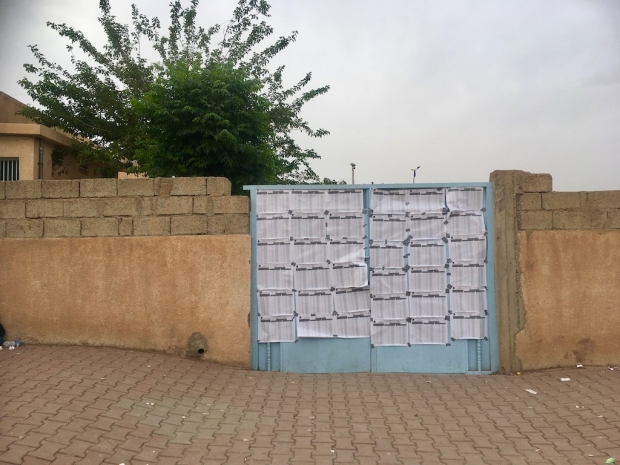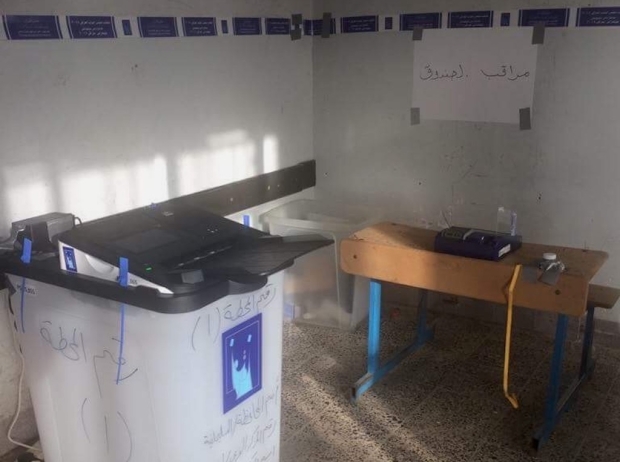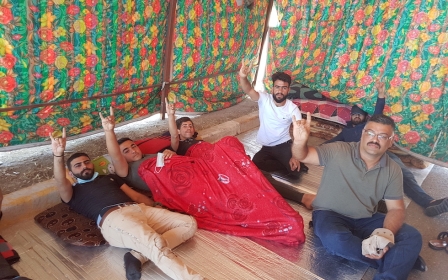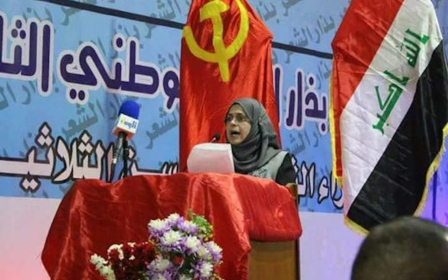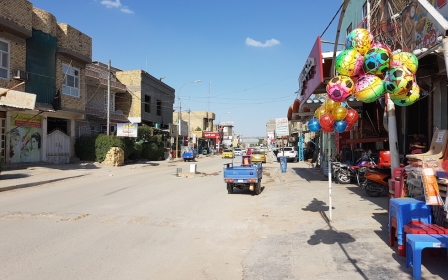'Our voices will go unheard': Displaced Iraqis claim threats on election day
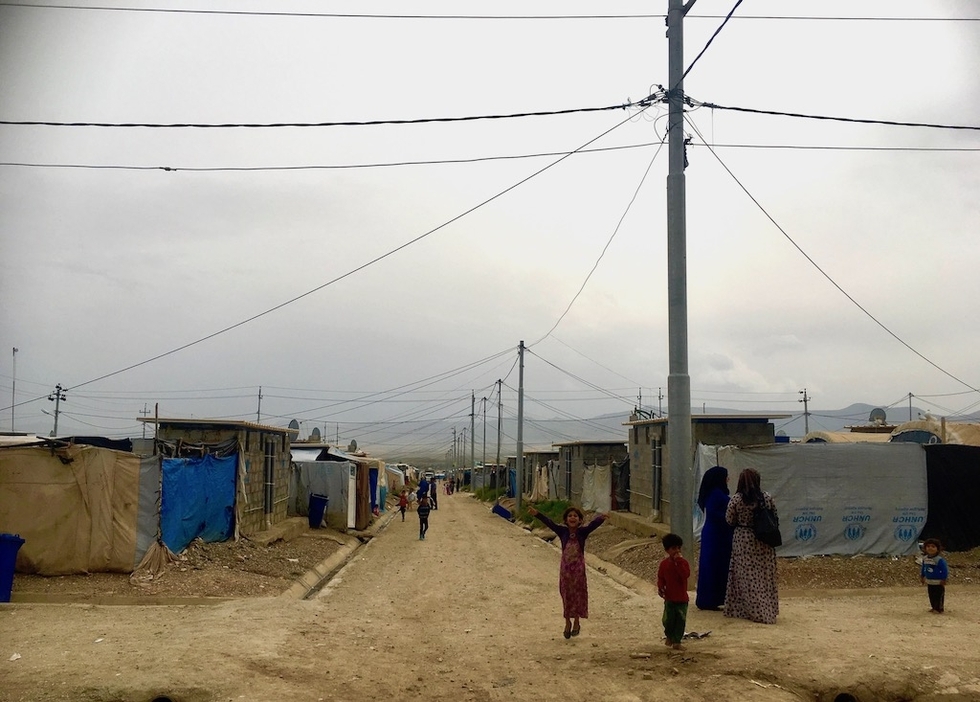
ARBAT, Iraq - On 12 May, Fatima walked to a school near the camp for internally displaced (IDP) Iraqis that has been her home for the last four years to cast her vote in national elections.
A 48-year-old farmer from Yathrib in the province of Salahaddin, Fatima lost her farmland and her nine children in clashes to drive out the Islamic State group when the militants overtook her city four years ago.
The force that now controls her town, an armed group affiliated with Iraq’s Hashd al-Shaabi (PMUs), demanded money when she tried to return home last year, she said, and threatened to behead her if she didn’t vote for the group's politicians in the May election.
The election was an opportunity to vote for a candidate she hoped would help her and thousands of others finally return home. But while waiting in line to cast her ballot, Kurdish security forces known as the Asayish shot rapid gunfire into the air, sending Fatima and hundreds of others running back to the camp in fear.
“It was a terrorising moment for us,” Fatima said. Afraid, she did not return to the school to vote.
“Our voices will go unheard. All we want is to elect someone who can secure safety and security for us so we can go back".
Iraqis went to the polls last week in the country's first national elections since 2014 and the onslaught of IS, over which Iraq declared victory in December. While many of the 5.3 million people forced to flee under IS have returned home, an estimated 2.1 million Iraqis - mostly Sunni Muslims, a minority in Iraq - remain displaced, according to the United Nations.
Sunni and Kurdish politicians made calls to postpone the elections late last year in order to allow displaced Iraqis more time to return home to vote. The Iraqi federal government and the US embassy in Baghdad had deemed the calls "unconstitutional," and Iraq’s Supreme Court later ruled against the calls in January.
Voter turnout from the elections stood at 44.52 percent, the lowest since the 2003 US-led invasion of Iraq. Despite the low turnout, many displaced Iraqis from Salahaddin, a province formerly under siege by IS and now a heavily politicised area in the country, wanted to vote but said that Kurdish security forces and election workers manipulated and cheated them on election day.
On Monday, the Iraqi High Electoral Commission (IHEC) said it had annulled ballots cast at 103 polling stations across the country following complaints of irregularities in Baghdad, Anbar, Nineveh, Salahaddin
Shortly after the election, six Kurdish parties called for an investigation into the election results, a call that was later echoed by the UN.
Mohammed, 23, tried to cast his ballot twice. A fight broke out between displaced families from Mosul and Salahaddin as they stood in line to vote outside the Ashti school polling station, he said. Gunfire by an estimated ten Asayish officers followed shortly after.
“They wanted to scare us so to go away [back to the camp],” he said.
“There was this gun, they could only shoot 20 bullets with it, but they had these American guns that they shot many bullets from for a long time. Kids and women were all on the floor and crying.”
When Ahmed, a 54-year-old teacher from Yathrib, took six of his family members to vote, he said that employees of Iraq’s High Electoral Commission (IHEC) tossed four of their voting cards in the trash. All displaced families in Arbat, which currently stands at 2,893 families, or 13,795 people, were forced to vote at only one polling station, he said, despite three polling stations in the town being designated by IHEC as open to the displaced.
The Asayish security forces then told him and his family that they could enter the polling station, but only if they voted for Shalal Abdul, a candidate on the ticket for the Patriotic Union of Kurdistan (PUK), a major Kurdish party.
“If you vote for Shalal, they would let you vote and if you are not voting for Shalal, then you can’t vote,” Ahmed said.
We want to elect someone who can represent us. It’s been four years here and we just want someone to hear and help us
- Fatima, voter
Shalal Abdul is the former mayor of Tuz Khurmatu, a multi-ethnic city in the disputed territories between Iraq and the country's semi-autonomous Kurdish region that are home to Kurds, Arabs and Turkmen. Violence erupted in the town and in the oil-rich city of Kirkuk on 16 October, with Iraqi and Kurdish forces clashing following a controversial independence referendum held by the Kurdistan Regional Government (KRG) in September.
Forces looted and set properties on fire and launched indiscriminate attacks in fighting that displaced tens of thousands, according to Amnesty International.
Iraqi PMU forces and Kurdish forces known as the Peshmerga have jointly controlled Tuz Khurmatu since 2003. The Peshmerga control predominantly Kurdish areas and the Iraqi PMUs control Arab and Turkmen sections of the city, and at different times one force dominates the other.
Five Kurdish candidates, including Shalal of the PUK, allied with Arab lists on the ballot in the Salahaddin province in this year’s elections. One PUK official described the party’s alliance as a “benefit” that would “secure local posts” for the PUK in the disputed city.
"The district of Tuz Khurmatu is part of Salahaddin province, and we are from Salahaddin," Ahmed said. "They tell you don’t vote for people from your place, instead vote for Tuz Khurmatu. They want Shalal to be elected.”
Mohammed also said that he was not allowed inside the polling station to cast his vote unless he voted for the PUK.
“I don’t want to vote for Shalal because I want to vote for someone who benefits us, and my tribe,” he said on election day.
Abdul, 20, and Mohammed said that the Asayish and election workers also bribed candidates to vote for the PUK. They said that Asayish officers and election officials offered voters from Salahaddin between 10,000 and 50,000 Iraqi dinars ($8 to $42) if they voted for the PUK and Shalal.
“The Asayish don’t let you get in unless you vote for Shalal, a Kurdish candidate,” Abdul said. “And they give you money too. If you vote for Shalal, here are ten thousand Iraqi dinars.”
Voter manipulation
Bushra Khalil, an IHEC employee at the Ashti school polling station, where many displaced families from camps in Arbat voted, said that only two of seven voting machines were working properly that day and that many voters’ names did not appear on registration lists. She described the polling experience at the school as one that “failed with excellence”, but denied reports that displaced communities had difficulties in casting their ballots.
“I heard gunshots from outside but I don’t know what happened,” she said. “I haven’t even heard anyone talk about it.”
Displaced communities from Salahaddin are not the only individuals that alleged voter manipulation for the city of Tuz Khurmatu. Two days before the election, Mishaan al-Jaburi, an Iraqi member of parliament, warned on Facebook that Asayish security forces throughout the KRG would manipulate residents of Salahaddin to vote for certain Kurdish candidates, including Shalal of the PUK. Arabic media outlets also reported similar accusations two days ahead of the vote.
While many formerly displaced Iraqis from Salahaddin were able to vote back home, many families still living in the Arbat camps said they cannot yet go back.
Ongoing sectarian and tribal tensions in the Salahaddin province and sporadic acts of violence impede the ability of many families to return to their hometowns.
Yathrib, a Sunni majority town surrounded by districts with Shia majorities, fell to IS in late 2014. The Shia communities suffered targeted killings and other atrocities under IS and fear a resurgence of the militant group, while displaced communities accuse the Shia tribes and militias now in control of demanding money and other punitive measures from the displaced who want to return, according to Minority Rights Group International.
The IOM said earlier this year that Salahaddin underwent “continued instability due to security incidents,” among them abductions and the destruction of farms and properties that resulted in many casualties, including displaced returnees.
Like Fatima, Ahmed also said he couldn’t go back home to Yathrib unless he paid the Asa’ib militia 500,000 Iraqi dinars ($420). The Asa'ib Ahl al-Haq, also known as the Khazali Network, is a Shia militia part of the larger Iraqi PMU force.
“I lost my car, my home, my farm,” he said. “I lost everything, all of it.”
Iraqis are still awaiting the final results of the election, but so far it looks as though Arab parties won the most votes in the province. While many Iraqi parties politicised the victory over IS and promised greater security in areas formerly under IS siege throughout their campaigns, many families from Salahaddin in Arbat hope - albeit with some trepidation - that they will be able to return home.
“We want to elect someone who can represent us,” Fatima said. “It’s been four years here and we just want someone to hear and help us.”
This article is available in French on Middle East Eye French edition.
Middle East Eye propose une couverture et une analyse indépendantes et incomparables du Moyen-Orient, de l’Afrique du Nord et d’autres régions du monde. Pour en savoir plus sur la reprise de ce contenu et les frais qui s’appliquent, veuillez remplir ce formulaire [en anglais]. Pour en savoir plus sur MEE, cliquez ici [en anglais].


